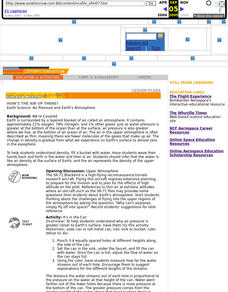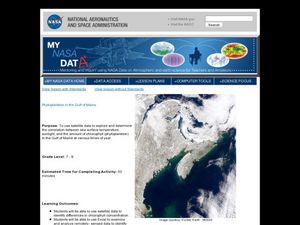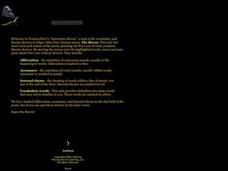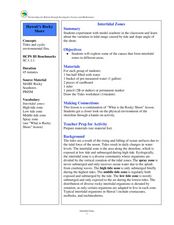Curated OER
Understanding Salinity
Young scholars discuss why the ocean is salty. They discuss what salinity is. Students are told that is they want to know how much salt is in a body or water, they would use a special scientific tool. They complete an Estuarine Layers...
Curated OER
How's the Air Up There?
Students experiment with soda cans and water to discover why air pressure is greater closer to Earth's surface.
Curated OER
When Fish Die
Learners discuss what to do with a very sick fish and help it to die without much pain. As a class, they answer questions about the fish and if they believe it is suffering or not. Using their own experiences, they share how they dealt...
Curated OER
Underwater vision
Students hypothesize what they expect to see on the fabric under each different color or light. For example: under what color light do they expect the fish to be brightest before looking at an ocean scene.
Curated OER
Density Currents
Students experiment with currents caused by temperature variations that simulate the origins and flow of polar bottom currents. They discover water density is affected by temperature and salinity, resulting in deep water currents.
Curated OER
Paleogeographic Mapping (o.k. Fossils Are Neat But What Good Are They?)
Students examine how evidence from fossils can be used in paleogeographic interpretation. They gain experience in developing multiple hypotheses.
Curated OER
The Buoyancy Factor
Students examine why some objects float in water while others sink and the ability of something to float does not depend entirely on its weight. Archimedes' principle is introduced and buoyant force is discussed. Practice calculations...
Curated OER
Venom!
Students examine the nature of venom. They conduct an experiment to demonstrate how proteins such as venoms can be denatured using raw eggs, beakers, heated water, and compresses.
Curated OER
Maintaining Body Heat
Learners observe and compare heat loss in various objects with surface area-to-volume ratios and transfer this comparison to the physical characteristics of animals in their environment. In small groups they conduct an experiment...
Curated OER
Precipitation
Students investigate the formation of rain. They experiment by boiling water in a tea kettle and placing ice cubes and water in a pan. They hold the pan of water over the steaming spout so that the steam strikes the bottom and sides of...
Curated OER
Let's Make Waves
Students investigate the concept of waves and how they are formed. The force of wind is demonstrated as the prime factor to the creation of ocean waves. Students research the concept in detail for better comprehension.
Curated OER
Warm up to the Gulf Stream
Students find out the temperature difference between the Gulf Stream and the surrounding water. They locate the Gulf Stream on the infrared image of the eastern seaboard of the US.
Curated OER
Ride the Wave!
Students examine how sonar works. They discuss the concept of sound waves, observe a demonstration of how sonar works using water, pie plates, and eyedroppers, and describe how sonar works in their own words.
Curated OER
Environmental Differences
Young scholars observe and conduct an experiment to see whether differences in salinity (the environment) have an affect on the hatching rate and survival of brine shrimp.
Curated OER
The Pressure's Off
Students investigate air pressure with four hands-on activities. They observe experiments by viewing Take a Look 2 #21.
Curated OER
Introduction to the Barnegat Bay Estuary
Students research estuaries. For this estuaries lesson, students discuss the differences in a bay and an ocean. Students watch a PowerPoint of the properties of the estuaries and geography of Barnegat Bay. Students complete a worksheet...
Curated OER
Nutrition and Health
Young scholars explore the conditions faced while sailing on the ocean regarding health and physical fitness. They experience the importance of Vitamin C. Students analyze the cause of many diseases and sicknesses on the ships.
Curated OER
Telegraphy
Students research the telegraph. In this telegraph lesson, students review the history of the telegraph. Students complete radio wave experiments. Students work in pairs to complete 3 sound exercises.
Curated OER
Phytoplankton in the Gulf of Maine
Students use satellite data to see the correlation between sea temperature and sunlight in the Gulf of Maine. In this phytoplankton lesson students use Excel to analyze data.
Illustrative Mathematics
Comparing Freezing Points
Subtracting negative numbers can be confusing to your middle schoolers. Here, they are able to draw a number line and put their answer in sentence form to check their understanding of negative numbers.
Curated OER
Let's Go Fishing
In this fishing worksheet, students study facts about fish and then answer short answer questions. Students answer 25 short answer questions.
Curated OER
Intertidal Zones
Students explore intertidal zones. In this intertidal zones lesson, students work in small groups and use ready-made materials to create a model of intertidal zones. Resources are provided.
Ask a Biologist
It’s a Plankton Eat Plankton World
For as small as they are, plankton sure play an enormous role in maintaining marine ecosystems. Dive into an investigation of these tiny organisms with a hands-on life science activity in which children cut out pictures of sea animals...
K12 Reader
Ben Franklin
Readers are asked to use the provided graphic organizer to list the main idea and supporting ideas in a passage about the inventions of Benjamin Franklin.

























